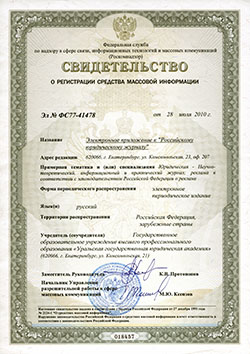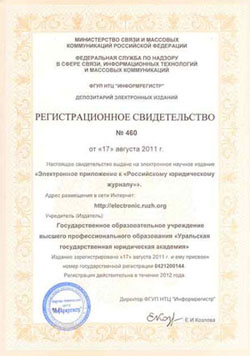 |
| Current Issue | Authors’ Guidelines | Contacts |  |
Electronic supplement to "Russian Juridical Journal" (est. 2010) is the open access scientific journal dedicated to fundamental research in law and related sciences. The concept of openness and accessibility encourages and promotes the emergence of innovative ideas in the field of law and the academic exchange of scientific information. The journal publishes scientific articles distinguished by novelty, topicality and an academic approach to research and presentation of results. Founder: Ural State Law University named after V. F. Yakovlev. It is issued 6 times a year.
All articles are published upon Open Access Statement, which means that all articles are available on the internet to all users immediately upon publication. Non-commercial use and distribution in any medium are permitted, provided the author and the journal are properly credited. OAS means also that all content is freely available without charge to the user or his/her institution. Users are allowed to read, download, copy, distribute, print, search, or link to the full texts of the articles in this journal without asking prior permission from the publisher or the author. Benefits of open access for authors, include: free access for all users worldwide; authors retain copyright to their work; increased visibility and readership; rapid publication; no spatial constraints; no processing charges and article submission charges. For more information on OAS see: the Budapest Open Access Initiative and Principles of Transparency and Best Practice in Scholarly Publishing
ISSN 2219-6838. Certificate of state registration number EL 77-41478 (July 28, 2010) by Roscomnadzor. According to art.1 (p. 1 p. 2), art.11 (p. 4) of FL 29.12.2010 № 436-FZ the journal is not subjected to marking.


The journal's mission is to provide a targeted and interested audience with systematic, practice-oriented, theoretical, and methodological information aimed at analyzing and addressing key theoretical, legal, and applied issues.
Objectives: to highlight legal issues; to provide the audience with the opportunity to conduct virtual discussions on stated issues; to engage the broadest possible audience in the discussion of legal issues to raise the level of legal culture and legal awareness; to foster the emergence of innovative and bold ideas in the field of law; and to facilitate the academic exchange of relevant scientific information.